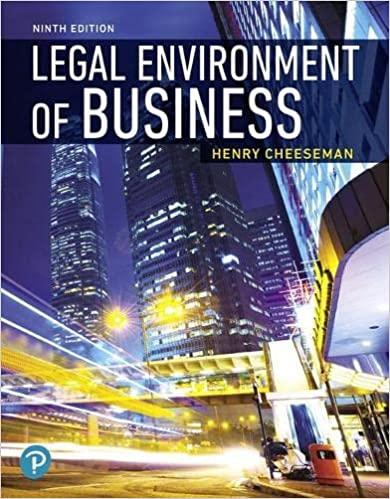Question
Case study CREDIT PARIS is a prominent French bank, having its seat in Paris. On 3 March 2017, CREDIT PARIS has entered into a complex
Case study
CREDIT PARIS is a prominent French bank, having its seat in Paris. On 3 March 2017, CREDIT
PARIS has entered into a complex loan agreement with a DIFC company, MORHEALTH, to build
a world-class medical facility to attract patients from West Africa looking for first-class medical
treatment. Of course, this loan agreement was backed by a guarantee signed by
MORHEALTH's mother DIFC company, HOLDINGLOUIS. The guarantee has been signed by
HOLDINGLOUIS and CREDIT PARIS on 3 March 2017. This latter agreement has also been
signed by MORHEALTH. Both agreements included an arbitration clause mentioning a three
arbitrators' tribunal and a seat in DIFC.
After having started to perform its obligations under the contract, MORHEALTH has ceased in
January 2018 to reimburse the loan as it should have done under the loan agreement. CREDIT
PARIS triggered the arbitration clause. CREDIT PARIS's statement of claims contends that
French Law should be applicable as the law of the bank which performs the fundamental
obligation. According to CREDIT PARIS, under French law, MORHEALTH is clearly in breach of
contract. The statement of claims also seeks to obtain the reimbursement of the loan in full,
but nothing more, as the bank does not want to jeopardize its reputation in DIFC. In its
statement of defense, MORHEALTH contends that the loan agreement is void. MORHEALTH
contends that under UAE/DIFC law, which should be applicable to the substance as the law of
the country where the borrower has its seat, the loan was subject to the completion of the
administrative process to obtain the authorization to build a medical facility in the DIFC, which
was finally denied in December 2017. The arbitral tribunal was comprised of three arbitrators:
Mr Lon, chosen by CREDIT PARIS; Mr Grohil, chosen by MORHEALTH, and the presiding
arbitrator chosen by the two other arbitrators, Mr Litt. The award has been rendered very
rapidly, in September 2018, by the majority of the tribunal and signed by Mr Lon and Mr Litt.
The tribunal has ruled that: the loan agreement is valid under English law; MORHEALTH has
to repay its debt in full immediately according to the terms of the loan agreement;
MORHEALTH also has to pay a certain amount to compensate for moral damages caused to
the bank.
2
As MORHEALTH appears clearly unable to abide by the award, CREDIT PARIS has decided to
activate the guarantee. HOLDINGLOUIS having refused to perform its obligation under the
guarantee agreement, CREDIT PARIS has decided to launch another arbitration proceedings,
this time against HOLDINGLOUIS. MORHEALTH has chosen M. Lon as Claimant's appointed
arbitrator. CREDIT PARIS's statement of defense asserts that HOLDINGLOUIS has to perform
its obligation under the guarantee agreement and, thus, to assume MORHEALTH's debt.
HOLDINGLOUIS' statement of defense contends that the loan agreement was void in the first
place. It also underlines that under French law, the guarantee agreement has to contain a
handwritten provision repeating the amount the guarantor pledges to reimburse to the
Obligee (CREDIT PARIS). There is no handwritten mention within the guarantee agreement. In
its statement of claims, the bank contends that this provision (on handwritten mentions in
guarantee agreements) is contained in the French Consumer Code and is an overriding
mandatory provision only applicable when the guarantor has its domicile on French territory.
You are also aware that HOLDINGLOUIS has sued CREDIT PARIS in DIFC courts to have the
guarantee agreement annulled.
Acting as the French bank's counsel in the DIFC you have to:
1) Identify any possible ground for annulment or refusal of enforcement of the award
rendered by the first arbitral tribunal;
2) Identify any ground to challenge the constitution of the second arbitral tribunal;
3) Assume that the first award has been annulled (this does not mean that it is the
expected outcome of the answer to question 1) and identify the consequences of this
annulment on the proceedings which oppose CREDIT PARIS and HOLDINGLOUIS;
4) Explain the legal reasoning put forward by CREDIT PARIS in its statement of claims to
exclude the application of the provisions of the French Consumer Code which could
be damaging to its case and try to rebuke any arguments to the contrary. (5 points)
5) Explain to CREDIT PARIS what stance to adopt as to the proceedings before DIFC
courts introduced by HOLDINGLOUIS to have the guarantee agreement annulled;
Step by Step Solution
There are 3 Steps involved in it
Step: 1

Get Instant Access to Expert-Tailored Solutions
See step-by-step solutions with expert insights and AI powered tools for academic success
Step: 2

Step: 3

Ace Your Homework with AI
Get the answers you need in no time with our AI-driven, step-by-step assistance
Get Started


